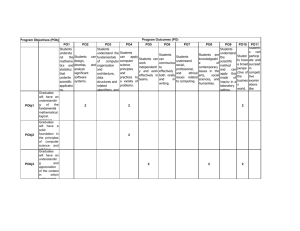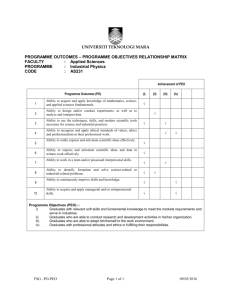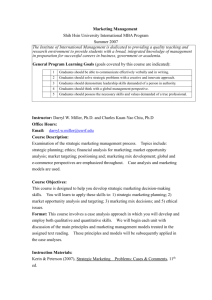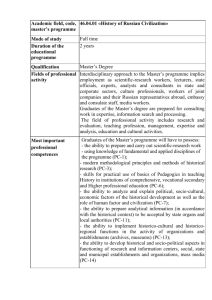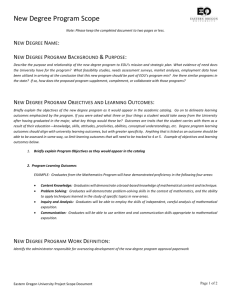IME 333 Materials Science Laboratory
advertisement
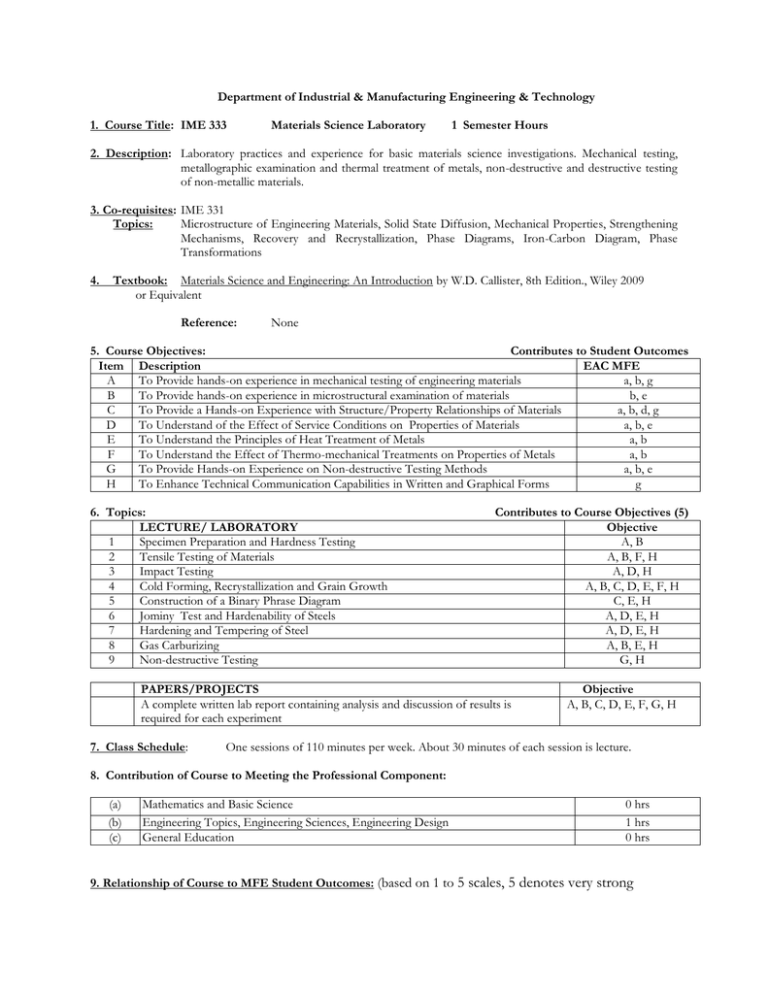
Department of Industrial & Manufacturing Engineering & Technology 1. Course Title: IME 333 Materials Science Laboratory 1 Semester Hours 2. Description: Laboratory practices and experience for basic materials science investigations. Mechanical testing, metallographic examination and thermal treatment of metals, non-destructive and destructive testing of non-metallic materials. 3. Co-requisites: IME 331 Topics: Microstructure of Engineering Materials, Solid State Diffusion, Mechanical Properties, Strengthening Mechanisms, Recovery and Recrystallization, Phase Diagrams, Iron-Carbon Diagram, Phase Transformations 4. Textbook: Materials Science and Engineering: An Introduction by W.D. Callister, 8th Edition., Wiley 2009 or Equivalent Reference: None 5. Course Objectives: Contributes to Student Outcomes Item Description EAC MFE A To Provide hands-on experience in mechanical testing of engineering materials a, b, g B To Provide hands-on experience in microstructural examination of materials b, e C To Provide a Hands-on Experience with Structure/Property Relationships of Materials a, b, d, g D To Understand of the Effect of Service Conditions on Properties of Materials a, b, e E To Understand the Principles of Heat Treatment of Metals a, b F To Understand the Effect of Thermo-mechanical Treatments on Properties of Metals a, b G To Provide Hands-on Experience on Non-destructive Testing Methods a, b, e H To Enhance Technical Communication Capabilities in Written and Graphical Forms g 6. Topics: LECTURE/ LABORATORY 1 Specimen Preparation and Hardness Testing 2 Tensile Testing of Materials 3 Impact Testing 4 Cold Forming, Recrystallization and Grain Growth 5 Construction of a Binary Phrase Diagram 6 Jominy Test and Hardenability of Steels 7 Hardening and Tempering of Steel 8 Gas Carburizing 9 Non-destructive Testing Contributes to Course Objectives (5) Objective A, B A, B, F, H A, D, H A, B, C, D, E, F, H B, C,C,HE, H A, D, E, H C, D, A, D, F E, H A, B, E, H C, D, G, E, F, HG PAPERS/PROJECTS A complete written lab report containing analysis and discussion of results is required for each experiment 7. Class Schedule: Objective A, B, C, D, E, F, G, H One sessions of 110 minutes per week. About 30 minutes of each session is lecture. 8. Contribution of Course to Meeting the Professional Component: (a) (b) (c) Mathematics and Basic Science Engineering Topics, Engineering Sciences, Engineering Design General Education 9. Relationship of Course to MFE Student Outcomes: (based on 1 to 5 0 hrs 1 hrs 0 hrs scales, 5 denotes very strong C continuation to the student outcome and blank cell denotes that the course does not continue the related student outcome) Outcome a b c d e f g h i j k A Graduate from Manufacturing Engineering Program Will Have: Manufacturing Engineering graduates will have an ability to apply knowledge of mathematics and science to manufacturing processes, materials, and design of manufacturing systems Manufacturing Engineering graduates will have an ability to design and conduct experiments, and to analyze and interpret data related to manufacturing processes, materials evaluation, and manufacturing systems Manufacturing Engineering graduates will have an ability to design, select, implement, and control a manufacturing system and its components or processes to meet desired needs Manufacturing Engineering graduates will have an ability to function on multidisciplinary teams and the ability to apply a concurrent approach and project management to process and product development Manufacturing Engineering graduates will have an ability to identify, formulate, and solve manufacturing engineering problems through a hands-on approach that considers constraints, costs, benefits, and comparative processes and materials Manufacturing Engineering graduates will have an understanding of the professional and ethical responsibilities of a manufacturing engineer Manufacturing Engineering graduates will have an ability to effectively communicate technical concepts through appropriate methods Manufacturing Engineering graduates will have an understanding of the impact of manufacturing engineering solutions in a global, economic, environmental, and societal context Manufacturing Engineering graduates will have a recognition of the need to engage in lifelong learning Manufacturing Engineering graduates will have a knowledge of contemporary issues facing manufacturing engineers Manufacturing Engineering graduates will have an ability to use the proper techniques, skills, and modern engineering tools necessary for manufacturing engineering practice utilizing supporting technologies 10. Prepared by: Saeed Saboury 3/2013 Reviewed by: Curriculum Committee Contribution 3.40 4.00 — 4.00 3.60 — 4.00 — — — —



